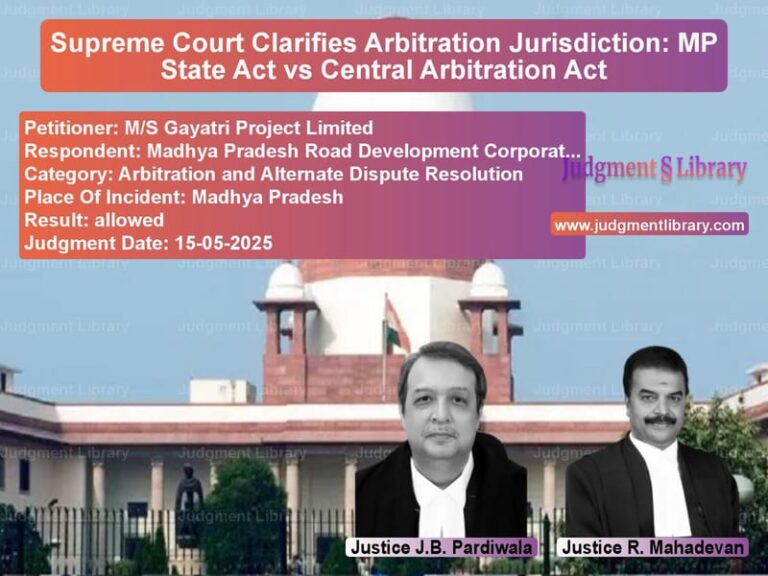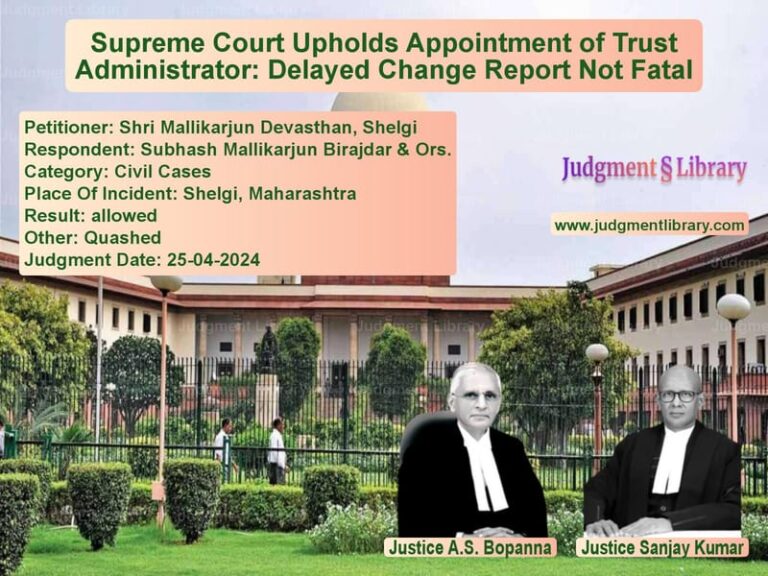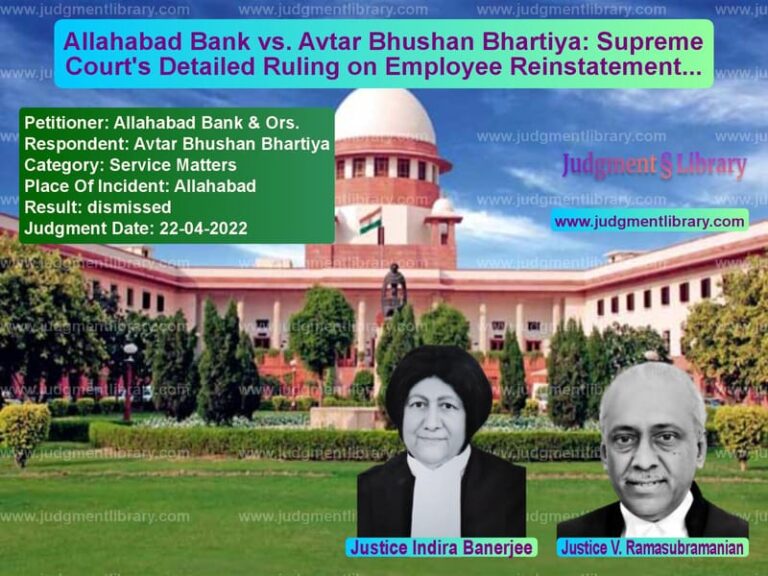Pension Benefits and Special Pay: Supreme Court’s Judgment on Scientists’ Claims
The case of Union of India & Ors. vs. Dr. O.P. Nijhawan & Ors. pertains to the claim by scientists working in the Defence Research and Development Organisation (DRDO), Department of Atomic Energy (DAE), and Department of Space (DOS) for the inclusion of special pay as part of their pay for pensionary benefits. The Union of India, through various ministries, had sanctioned special pay to these scientists in 1996 and 2006. However, the issue arose when the special pay was not included in the computation of their pensions, which led to several legal proceedings.
The scientists had been granted special pay of Rs. 2,000 per month in 1996 and Rs. 4,000 per month in 2006 in lieu of a higher pay scale. The issue was whether this special pay could be treated as part of their basic pay for pension calculations, as the Union of India had issued clarifications that this special pay would not be included for purposes like DA, HRA, and pension.
Background of the Case
The respondents, including Dr. O.P. Nijhawan and others, had served as Scientists ‘G’ in DRDO. In the year 1996, a peer review led to the sanctioning of special pay to the scientists working in DRDO, DAE, and DOS, which was intended to remedy an anomaly arising from the merger of pay scales in the Fifth Central Pay Commission. The special pay was meant to address the issue of lower pay scales that scientists had been moved to after the merger, but the dispute centered around whether this special pay should count towards pension benefits.
The Central Administrative Tribunal (CAT) ruled in favor of the scientists, ordering that the special pay should be included in their pension calculations. The Union of India challenged this order in the High Court, which dismissed the petition and upheld the CAT’s decision. This led to appeals being filed in the Supreme Court.
Petitioner’s Arguments
The Union of India, as the appellant, argued that:
- The definition of “pay” under Fundamental Rule 9(21)(a)(i) clearly excludes special pay from the computation of pension, and therefore, the special pay sanctioned to the scientists should not be included in their pay for pensionary benefits.
- The orders of the Central Administrative Tribunal and the High Court were in violation of the existing rules regarding special pay and pension, which do not allow the inclusion of special pay for pensionary purposes.
- Implementing the judgment would result in significant financial implications for the government.
Respondent’s Arguments
The respondents contended that:
- The special pay of Rs. 2,000 per month (w.e.f. 01.01.1996) and Rs. 4,000 per month (w.e.f. 01.01.2006) was granted to compensate for the merger of higher pay scales and was not intended to be excluded from the definition of pay.
- The special pay was granted in lieu of a separate higher pay scale, not as additional pay for arduous duties, and thus should be treated as part of their basic pay for pensionary purposes.
- Similar relief had been granted to other scientists, and denying it to them would be discriminatory and unfair.
Supreme Court’s Observations and Ruling
The Supreme Court ruled in favor of the respondents, dismissing the appeals filed by the Union of India. The key observations made by the Court were:
1. Question of Law: Preclusion from Raising Issues
The Court considered the earlier dismissals of Special Leave Petitions (SLPs) and the judgments of the High Court, which had already addressed similar issues:
“The fact that earlier writ petitions and SLPs filed by the Union of India were dismissed does not preclude the Union from raising the issues in these appeals, as the question of law was left open by this Court in the earlier proceedings.”
The Court found that the principle of res judicata or estoppel did not apply in this case, and the Union of India could still raise the issue of law.
2. Definition of Pay and Special Pay
The Court examined the definition of “pay” under Fundamental Rule 9(21)(a)(i) and the definition of “special pay” under Fundamental Rule 9(25). The Court noted that special pay is meant to compensate for the arduous nature of duties or a specific addition to responsibilities:
“The special pay granted to the respondents was not due to the arduous nature of their duties, but was granted in lieu of a separate higher pay scale. Therefore, it does not fit within the definition of special pay as described in Rule 9(25).”
Thus, the Court concluded that the special pay granted to the scientists should be included in their pay for pensionary purposes.
3. The Nature of the Special Pay
The Court observed that the special pay granted to the respondents was a compensation for the pay scale anomaly, and was not intended to be excluded from the definition of pay:
“The special pay was granted to remedy a pay structure anomaly, and as such, it should be treated as part of the pay for pensionary benefits.”
Therefore, the Court ruled that the special pay of Rs. 2,000 and Rs. 4,000 should be included for pension purposes.
4. Discriminatory Treatment and Financial Implications
The Court found that denying pensionary benefits based on the special pay would be discriminatory, especially since similar benefits had already been granted to other scientists in the same categories:
“Not granting the benefit to the respondents would be unjust and discriminatory, as similar relief has been granted to their colleagues in other departments.”
The Court emphasized that the Union of India could not discriminate against the respondents by not extending the same benefit to them.
Conclusion
The Supreme Court’s ruling clarified the interpretation of special pay in relation to pension benefits for government employees, particularly in the context of scientists working in DRDO, DAE, and DOS. The Court held that the special pay of Rs. 2,000 and Rs. 4,000, granted to the respondents, should be included in the calculation of their pensions, as it was intended to remedy pay scale anomalies rather than serve as a special allowance for additional duties.
This judgment reinforces the principle of fairness and equality in public service benefits, ensuring that government employees are not unfairly deprived of pensionary entitlements that they are legally entitled to receive.
Petitioner Name: Union of India & Ors..Respondent Name: Dr. O.P. Nijhawan & Ors..Judgment By: Justice Ashok Bhushan, Justice L. Nageswara Rao.Place Of Incident: India.Judgment Date: 03-01-2019.
Don’t miss out on the full details! Download the complete judgment in PDF format below and gain valuable insights instantly!
Download Judgment: Union of India & Ors vs Dr. O.P. Nijhawan & Supreme Court of India Judgment Dated 03-01-2019.pdf
Direct Downlaod Judgment: Direct downlaod this Judgment
See all petitions in Employment Disputes
See all petitions in Pension and Gratuity
See all petitions in Judgment by Ashok Bhushan
See all petitions in Judgment by L. Nageswara Rao
See all petitions in dismissed
See all petitions in supreme court of India judgments January 2019
See all petitions in 2019 judgments
See all posts in Service Matters Category
See all allowed petitions in Service Matters Category
See all Dismissed petitions in Service Matters Category
See all partially allowed petitions in Service Matters Category







